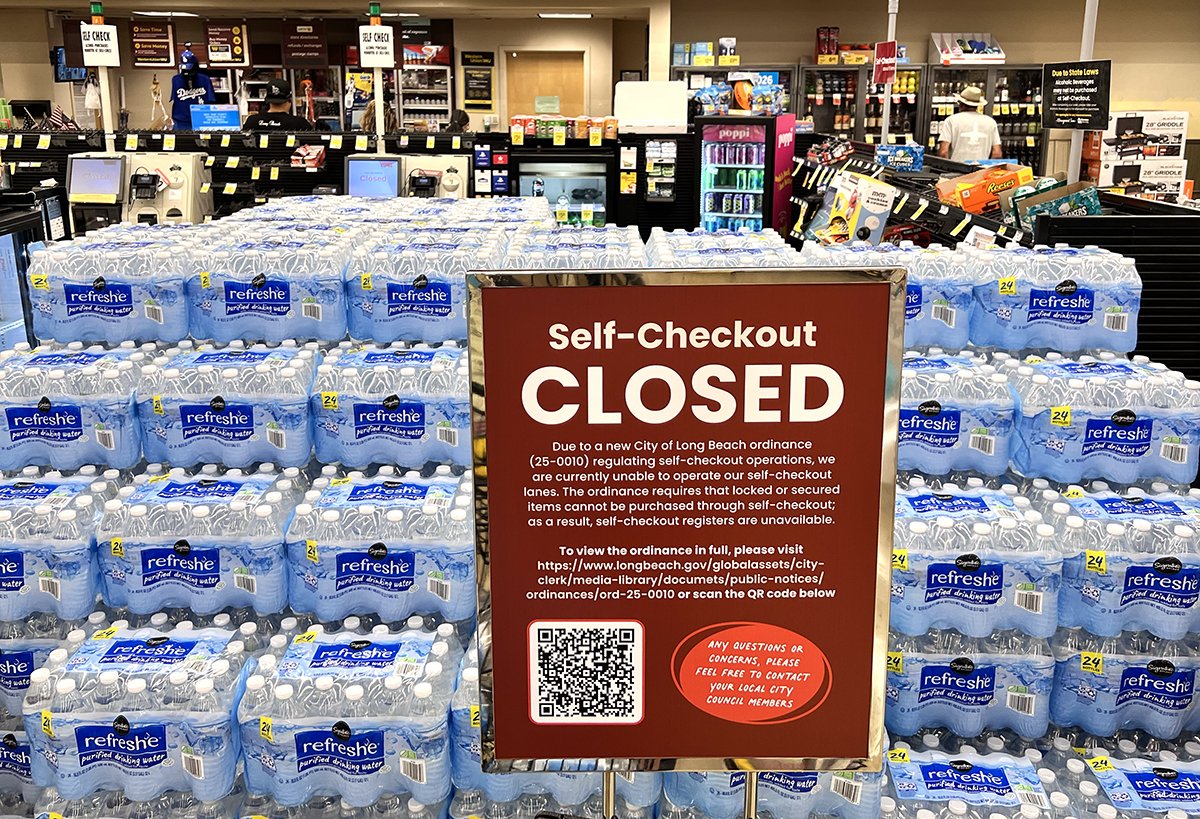Self-checkout lanes are closed at Vons grocery stores across Long Beach, with signs saying it’s because of a local ordinance regulating self-checkout that went into effect earlier this month.
All four Vons locations — near the Traffic Circle, in Belmont Shore, downtown and on Spring Street in East Long Beach — shut down their self-checkout stations. The change took effect Monday, according to a spokesperson for the union that represents grocery workers. It’s unclear if it will be permanent or temporary.
A Vons representative didn’t immediately respond to questions, but customers walking into stores were greeted with a sign that blamed a recently passed Long Beach law:
“Due to a new City of Long Beach ordinance (25-0010) regulating self-checkout operations, we are currently unable to operate our self-checkout lanes,” the message read.
The Albertsons on Willow Street in Wrigley also closed its self-checkout station. Ralphs, as of Tuesday evening, has kept its self-checkout lanes open.
This comes two weeks after the Long Beach City Council gave final approval to a law it dubbed “Safe Stores are Staffed Stores.” Debate over the ordinance pitted unions — who argued it would help keep workers safe and reduce retail theft — against store operators, who said it was a thinly veiled attempt to force them to hire more union labor.
It establishes a 3:1 staffing ratio, where larger grocery stores and retail drug stores must staff at least one worker to supervise every three self-checkout stations. It also limits self-checkout lanes to purchases of 15 or fewer items and bans certain locked items from being purchased through self-checkout.
The sign in Vons specifically singles out the locked item requirement. Because of that rule, “self-checkout registers are unavailable,” the notice reads.
Violating the new law can open up stores to fines and the possibility of being sued. For instance, every hour a store fails to meet staffing requirements, it can be charged up to $2,500 for each violation.
The law allows businesses — roughly 19 affected citywide — 30 days to implement the new rules, which critics of the law say is simply not enough time.
“A lot of grocers are finding it extremely challenging,” said Nate Rose with the California Grocers Association.
Rose said the issue might be chalked up to the time needed to update kiosks to not allow some locked-item purchases in self-checkout.
“It’s because of how things are categorized in their system,” he said. “The razor blade that you want to buy, in some stores, it’s locked up. Maybe some stores, it’s not. And the self-checkout machine has to be able to detect that.”
Celeste Wilson, with the Long Beach Chamber of Commerce, said there is also confusion around square-footage rules in the new law that apply to both food and drug stores: Those more than 15,000 square feet in size that sell primarily household groceries and those more than 85,000 square feet with at least 10% of their sales floor dedicated to the sale of foodstuffs.
Without knowing for sure, Wilson said businesses may close the stations during the 30-day implementation period or until they can prepare their stores for the new ordinance.
“While they’re kind of figuring out all the nuances of the ordinance and trying to implement all those different things, I think that they’re just going to close down the self-checkout stands until they have something a bit more structured in place,” Wilson said.
Derek Smith, the political director with UFCW 324, which has members at stores across the region, said grocers were following the rules of the ordinance during a visit to their sites on Tuesday.
“It does not require them to keep self-checkout open,” Smith explained. “They can certainly close the self-checkout. Now, if they do, I would hope they consider customers and wait times and that they would put folks back on cashier lines, but they are following the ordinance.”
While he’s not sure how long the closures will last, Smith said it’s understandable for the stores to “work out kinks.”
“We want to work with the industry to the extent that we can to make sure that’s a good rollout that works for workers and customers,” Smith said. “I think they are entitled to some time to kind of work out kinks.”
Editor’s note: An earlier version of this story misstated the required staffing ratio. It was also updated to correct the spelling of Nate Rose’s name.

